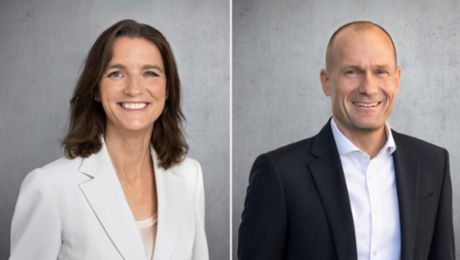- The product range is to be specifically supplemented by brand-defining vehicle models with combustion engines.
- The new SUV series above the Cayenne, which has so far been intended as all-electric, will initially be offered exclusively as a combustion engine and plug-in hybrid model due to market conditions.
- The existing combustion engine models will remain available for a longer period. New generations of successor models have been added to the Cycle Plan for these vehicle models.
- The development of the planned new platform for electric vehicles in the 2030s will be rescheduled.
- The existing all-electric model range is being continuously updated.
- These measures are intended to support financial results in future fiscal years but will lead to considerable additional depreciation and provisions in the short term.
With this, the sports car manufacturer aims to achieve a positive impact on the financial figures for the medium to long-term period. “Today we have set the final steps in the realignment of our product strategy. We are currently experiencing massive changes within the automotive environment. That's why we're realigning Porsche across the board,” says CEO Dr. Oliver Blume. “In doing so, we want to meet new market realities and changing customer demands – with fantastic products for our customers and robust financial results for our investors.”
New brand-defining vehicle models with combustion engines
The product range is to be supplemented by brand-defining vehicle models with combustion engines. Due to market conditions, the new SUV series above the Cayenne, which was previously planned to be fully electric, will initially be offered exclusively as combustion engine and plug-in hybrid at market launch. In addition, current models such as the Panamera and the Cayenne will be available with combustion engines and plug-in hybrids well into the 2030s. New generations of successor models have been added to the Cycle Plan for these vehicle models.
Certain all-electric models will be introduced later
In return, due to the delayed ramp-up of electric mobility, the market launch of certain all-electric vehicle models is planned to take place at a later date. In particular, the development of the planned new platform for electric vehicles in the 2030s is to be rescheduled. The platform is to be technologically redesigned in coordination with other brands within the Volkswagen Group. This is the company’s response to the significant slower growth of the demand for exclusive battery-electric vehicles. Nevertheless, the existing all-electric model range is being continuously updated. With the Taycan, Macan, Cayenne and the future two-door sports car in the 718 segment, there will be an attractive BEV offering.
Dr. Oliver Blume: “These decisions build on the previously announced initiatives and help us to achieve a very balanced portfolio. This increases our flexibility and strengthens our position in a currently highly volatile environment. With a convincing mix of combustion engines, plug-in hybrids and battery-electric vehicles, we want to meet the entire range of customer requirements. In the medium term, this approach is intended to support our business model and strengthen our market position.”
At the same time, Porsche expects considerable additional burdens due to the changed external framework conditions. These include US import tariffs, the decline in the Chinese luxury market, and the slowdown in the ramp-up of electric mobility. The company assumes that the strategic realignment envisaged in the cycle plan will only partially compensate these additional burdens. Accordingly, Porsche is now aiming for a medium-term operating return on sales in the double-digit range, with good business development of up to 15%. This corresponds to the lower end of the previous range.
The rescheduling of the new platform for electric vehicles will necessitate depreciation and provisions, which are expected to burden the operating profit in the 2025 financial year by up to 1.8 billion euros. The current forecast for the 2025 financial year published by Porsche does not take these burdens into account. Against this background, the company has decided to adjust the forecast for the 2025 financial year. The expectations for the 2025 financial year are now as follows:
- A sales revenue between 37 and 38 billion euros (previous forecast: 37 to 38 billion euros),
- A slightly positive return on sales up to 2 % (previous forecast: 5 to 7%),
- An automotive net cash flow margin between 3 and 5 % (previous forecast: 3 to 5%),
- An automotive EBITDA margin between 10.5 and 12.5 % (previous forecast: 14.5 to 16.5%), and
- An automotive BEV share in Automotive between 20 and 22 % (previous forecast: 20 to 22%).
For the 2025 financial year, the Executive Board intends to propose the distribution of a dividend, that would significantly exceed the communicated medium-term dividend policy of approximately 50% of IFRS profit of the group after taxes in terms of the percentage payout ratio. However, in terms of the actual amount, such a dividend distribution would be significantly lower than that of the previous year. Final decisions by the relevant committees regarding the dividend amount are still pending.
“With this clear plan, we are recalibrating the company for long-term success in a world with challenging conditions. We recognize that these strategic investments weigh on our short-term financial results – but they are essential. The measures will sharpen our brand identity and make our products even more desirable and our company even more resilient,” emphasises Dr Jochen Breckner, Member of the Executive Board for Finance and IT at Porsche AG. Overall, Porsche expects extraordinary expenses of around 3.1 billion euros for the 2025 financial year in connection with the strategic realignment. They include the measures currently adopted and previously decided adjustments to the product strategy, as well as battery activities and organizational changes. In connection with the realignment, further cash outflows are expected in the coming years.
Disclaimer
This press release contains forward-looking statements and information that reflect Dr. Ing. h.c. F. Porsche AG's current views about future events. These statements are subject to many risks, uncertainties, and assumptions. They are based on assumptions relating to the development of the economic, political, and legal environment in individual countries, economic regions, and markets, and in particular for the automotive industry, which we have made on the basis of the information available to us and which we consider to be realistic at the time of publication. If any of these risks and uncertainties materializes or if the assumptions underlying any of the forward-looking statements prove to be incorrect, the actual results may be materially different from those Porsche AG expresses or implies by such statements. Forward-looking statements in this presentation are based solely on the circumstances at the date of publication. We do not update forward-looking statements retrospectively. Such statements are valid on the date of publication and can be superseded. This information does not constitute an offer to exchange or sell or an offer to exchange or buy any securities.

